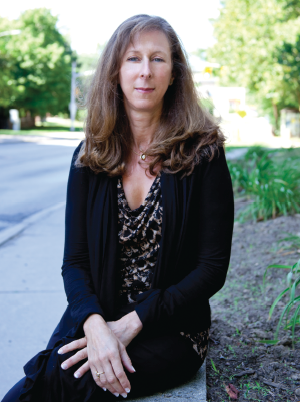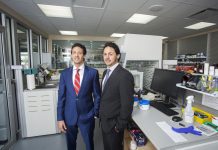Esther Konigsberg,MD
Bringing integrative medicine into medical school
Integrated Healthcare Practitioners set out with a mission of bridging the gap between conventionally trained and integrative healthcare providers. Dr Esther Konigsberg, MD is single- handedly delivering major advances towards that mission. With an undergraduate degree from McGill in Psychobiology completed in 1980, Esther went on to receive her medical training (school and residency in family medicine) from McMaster in 1985. By the early 1990s her interest in integrative medicine had peaked and she began expanding her tool bag by pursuing training in a variety of areas outside the domain of conventional medicine.
“I was always interested in a different approach”, describes Esther. “All we were learning about in medical school was disease… there wasn’t anything about health!” “Our role models weren’t very healthy people; they were sleep deprived, ate quickly and poorly, sacrificed time with family to be a good doctor”. She describes multiple seminars offered by Deepak Chopra as immensely influential in terms of her current day practice model, as well as a two- year fellowship program in integrative medicine from the University of Arizona. Today, Esther is responsible for establishing the Introduction to Complementary and Alternative Medicine curriculum at McMaster University School of Medicine, exposing all students of medicine to the discipline of integrative medicine during their final year of study.
Dr Konigsberg established the Introduction to Complementary and Alternative Medicine curriculum at McMaster in 2007. It includes a lecture outlining a wide array of integrative techniques, as well as having students visit with at least one private practitioner of integrative medicine (Chiropractic, Osteopathic, Naturopathic, Chinese Medicine and an energy therapy by a regulated health care practitioner. ) for a half day. Students are encouraged to experience a treatment from an integrative healthcare provider of their choice, and report back to classmates on the type of practitioner visited, the treatment they experienced, and their overall impression of the strategies employed by the practitioner. The success of the program among medical students at McMaster has resulted in an expansion of the program in October of this year. A half day “Introduction to Complementary and Alternative Medicine” is being offered to nurse practitioners, occupational therapists, physiotherapists, midwives, physician assistants, and others.
Esther has expanded this vision of education on integrative medicine for conventionally trained physicians by sitting on the steering committee of the Consortium of Academic Health Centres for Integrative Medicine. Four schools in Canada and 46 schools in the United States are members of the consortium, including institutions such as Harvard, Yale, Columbia, Stanford, and the Mayo clinic. The consortium meets twice per year, with a mandate of furthering education, research, and clinical practice of integrative medicine. In order for an institution to become a member of the consortium, the institution must have the backing of the institution’s Dean. Thereafter, the institution must satisfy at least two of the following three criteria: provide education in integrative medicine, conduct research in integrative medicine, and have a clinic of integrative medicine.
“Esther has expanded this vision of education on integrative medicine for conventionally trained physicians by sitting on the steering committee of the Consortium of Academic Health Centres for Integrative Medicine.”
Dr Konigsberg has been practicing as an MD in Burlington for over two decades… As her interest in integrative medicine expanded, her style of practice evolved with her new training. Esther chose to abandon the traditional model of conventional practice, and has since joined forces with two established multidisciplinary clinics in the Greater Toronto Area. Splitting her practice time between the Lakeshore Clinic in Burlington and the Commerce Court Health Centre in downtown Toronto, Esther has surrounded herself with a large team of integrative practitioners representing a wide array of disciplines. Esther describes that this eclectic mix of like- minded practitioners creates the environment she feels most comfortable practicing in.
Esther’s style of practice exemplifies her views on health, wellness, and the role of a physician. She describes the immensely detailed health history taken with each patient, with questions concerning energy, sleep pattern, diet recall, the patient’s impression of their purpose and meaning in life, stresses, and takes time to listen to “the patient’s life story”. From this detailed intake an individualized health plan is created. The plan includes interventions from the area of mind/ body medicine, typically in the form of a meditation prescription. Prescription for physical activity is routine, as is a detailed nutritional program. Vitamin/ mineral/ nutraceutical supplementation as well as botanical medicines are routinely included. Bioidentical hormone therapy is also a routinely utilized treatment strategy. When asked what types of patients are arriving, we were not surprised to learn a very diverse range of patient concerns were benefiting from this eclectic style of practice; cancer survivors, individuals with an array of autoimmune disorders, mental health concerns such as anxiety and depression, and an inspiring subset of patients who have reached midlife and are actively seeking health and wellness, or “prevention”. Dr Konigsberg adds with frustration that “we spend billions of dollars on end of life care, and neglect spending on primary disease prevention.”
IHP is grateful to Dr Esther Konigsberg and the teams at the Commerce Court Health Centre and the Lakeshore Clinic for allowing us to showcase their work and facilities to you. The introduction of education in integrative medicine into curricula of conventional medicine is an exciting level of progress that we hope all institutions of medical training in Canada work their way towards. In theory, the present teachings on usage statistics and imposed experience with a practitioner of integrative medicine can be expanded, possibly to include an introduction in clinical application of integrative medical therapeutics? The number of conventionally trained physicians implementing various aspects of integrative medicine in clinical practice is growing at an exponential pace; we would like to see their interest encouraged.
















